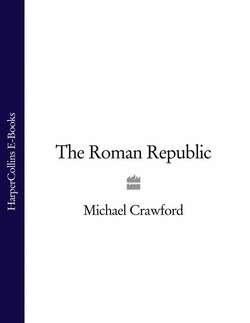Читать книгу The Roman Republic - Michael Crawford - Страница 6
Historical Introduction
ОглавлениеBetween the sack of Rome by the Gauls in 390 BC and the middle of the second century BC, a part-time army of Roman peasants, under the leadership of the ruling oligarchy, conquered first Italy and then the Mediterranean; the loyalty of the Roman population to its leaders was assured by a share in the rewards of victory. As the empire expanded, it became harder for the lower orders to gain access to these rewards, while at the same time competition within the oligarchy became more intense. The peasant armies of Rome were drawn into the conflicts born of this competition and the Republic dissolved in anarchy.
Some parts of this story may perhaps seem unduly dramatic; I can only say that a century like that between 133 BC and 31 BC, which killed perhaps 200,000 men in 91–82 and perhaps 100,000 men in 49–42, and which destroyed a system of government after 450 years was a cataclysm.
Three other themes also figure largely. In the first place, it seems to me important that the prevailing ideology of the Roman governing class was one which facilitated change, including in the end the abolition of Republican government itself; for it permitted and even encouraged the justification in traditional terms of actions which were in fact revolutionary.
The Roman state was one in which libertas, freedom, was early identified with civitas, citizenship, that is to say, political rights and duties; libertas was therefore universally accepted as desirable and trouble only arose when the question was raised of whose libertas was to be defended. At the same time, great services to the state brought a man dignitas, standing, and auctoritas, influence; and naturally both were sought after by all men of great ability or noble descent.
In the history of the Republic, appeal was made to the concepts of libertas and dignitas both by those who sought to introduce radical change, notably by appealing to popular opinion against aristocratic consensus and by attempting to increase the material privileges of the people, and by those who sought to preserve the status quo, both in terms of political power and in terms of the distribution of resources.
The struggles between politicians during the Republic were given free rein by the failure to develop communal institutions for the maintenance of order; thus even legal procedure often involved the use of an element of self-help, as in bringing a defendant to court. Such a state of affairs perhaps did not matter greatly in a small rural community, and the struggle of the Orders, between patricians and plebeians, was in the end resolved in the course of the fifth and fourth centuries BC. But when men turned to force in the late Republic to resolve political differences, the result was catastrophic, with armies composed of many legions rapidly involved.
Secondly, I should like to stress the innovativeness of the governing class of the Republic in a wide variety of fields, cultural as well as political. If one looks at the two centuries between the Second Punic War and the age of Cicero, the impression is of an enthusiastic borrowing of Greek artistic and intellectual skills, slowly leading to the emergence of a developed Latin culture; the central period of Hellenization of the Roman oligarchy was precisely the period when it was locked in escalating internal competition which finally destroyed the system.
Finally, I have attempted to illustrate how the sources for a particular event often adopt, consciously or unconsciously, a polemical approach and how the development of this polemic is itself part of Republican history. The sources for the history of the Republic, indeed, leave much to be desired; the works of Roman and Greek historians contemporary with the events which they chronicled have largely perished; so too have most official records; even the works of later historians who reproduced and reshaped the material in earlier historians and in official records are rarely complete. But our inadequate knowledge of what happened is partly compensated for by the possibility of observing something of how the Romans saw their past and how that vision affected their conduct.
